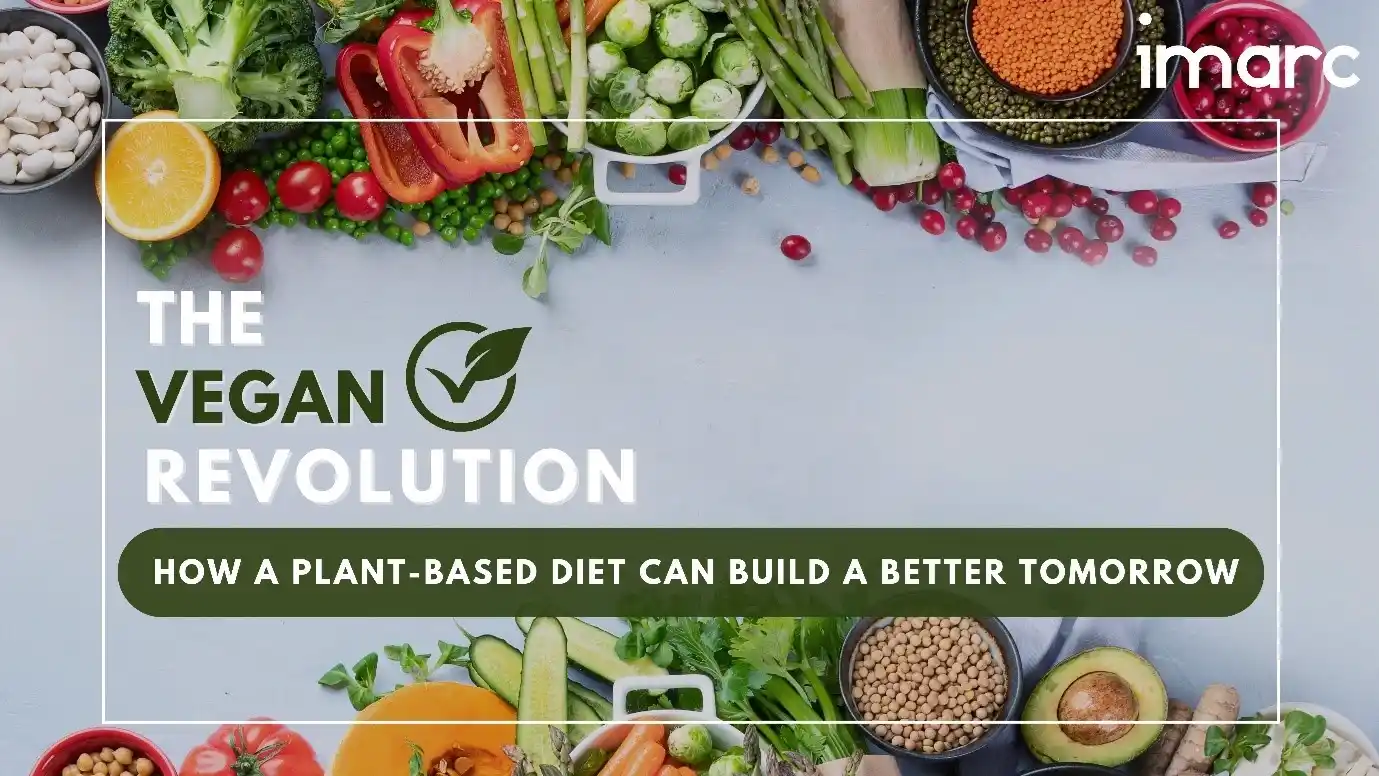The Vegan Revolution: How a Plant-Based Diet Can Build a Better Tomorrow

A vegan, or a plant-based diet, focuses mainly on consuming fruits, vegetables, grains, legumes, nuts, and seeds. It excludes all animal-derived products and ingredients, including meat, poultry, fish, dairy, eggs, and honey. Nowadays, people are shifting toward vegan diets for a variety of reasons, such as ethical concerns for animal welfare, environmental sustainability, health benefits, and personal preferences.
People following veganism also include plant-based substitutes for animal products. Dairy alternatives (soy milk, almond milk, and coconut milk) and plant-based proteins (tofu, textured vegetable protein, and seitan) are the main types of processed vegan foods available in the market.
Veganism: A Sustainable and Ethical Choice for the Future
The global vegan food market is expected to exhibit a CAGR of 9.7% during 2023-2028, as per the recent findings by IMARC Group. The popularity of plant-based foods has increased substantially over time. Various factors contributing to the market's growth are outlined below.
Increasing Health and Wellness Concerns: People are widely adopting veganism as it is known to improve conditions related to the heart, stomach, kidneys, and nervous system. A vegan diet also helps to manage weight, cholesterol levels, and diabetes, reduce the risk of chronic diseases and improve digestion.
Food Technology Advancements: Market players have developed innovative plant-based products similar to animal-based foods in taste, texture, and appearance. Innovations in food technology are playing a major role in increasing the popularity of vegan food.
Increasing Animal Welfare: Many consumers are avoiding animal products to minimize the suffering of animals raised for food. The increasing awareness and concerns about animal welfare and cruelty against animals are driving the demand for vegan food.
Promotional Campaigns: Celebrities, athletes, and social media influencers are widely promoting plant-based products. Such endorsements attract consumers to vegan foods, thereby expanding the market growth.
Increasing Availability and Variety: Many companies in the vegan food industry are expanding their product portfolios, as well as utilizing a variety of retail channels such as supermarkets and hypermarkets, convenience stores, specialty stores, and online stores. In addition, various restaurants and food service providers are expanding their vegan offerings to cater to the changing consumer preferences.
Apart from this, many leading players, including Amy's Kitchen, Inc., Beyond Meat, Inc., Daiya Foods, Inc., Danone SA, Eden Foods, Inc., Plamil Foods Ltd., and Archer Daniels Midland Company, are heavily investing in packaged vegan food items. In confluence with the expanding food and beverage industry, such investments are creating a positive market outlook.
Latest Headlines in the World of Vegan Food
- Beyond Meat, a leading plant-based meat company, has launched a range of three plant-based frozen ready meals in the UK. The meals, which are available from selected retailers, are spaghetti Bolognese, keema curry and pilau rice, and chili with coriander rice.
- Franklin Farms, a division of Keystone Natural Holdings, has expanded its plant-based product line with the launch of plant-based tuna in original and jalapeño flavors. It is made with a blend of plant-based proteins and is designed to taste, cook, and look like real tuna.
- The Munich-based food tech startup Greenforce has launched a vegan Leberkäse (a German meatloaf traditionally made from beef, pork, and bacon) made from pulses.
- Singapore’s Float Foods has launched Asia’s first plant-based poached egg and egg yolk for the food service industry.
The Next Chapter: Anticipating the Future of the Vegan Food Market
The demand for vegan food will continue to rise due to increasing awareness of the environmental, health, and ethical benefits associated with plant-based diets. In addition, animal welfare and personal well-being will also play a major role in the growth of the market.
Moreover, the expansion of vegan product offerings and the development of innovative plant-based alternatives for traditional animal-based products such as meat, dairy, and eggs to cater to a wider range of consumer preferences is another major factor that will contribute to the market growth.
Also, technological advancements in the manufacturing of vegan food, including cellular agriculture and lab-grown meat, will play a major role in the future of vegan food. In line with this, restaurants, cafes, and other food service establishments are increasing vegan offerings on their menus, which is expected to boost the market in the coming years.
Crafting a Vegan-Friendly Portfolio: A Strategic Imperative for the Food and Beverage Industry
Companies in the food and beverage industry must set goals for the development of innovative vegan food products. It is necessary for them to analyze their existing product portfolio and identify areas where vegan alternatives can be introduced. Organizations should find reliable suppliers of plant-based ingredients and ensure their quality and sustainability. Apart from this, analysis of demand, supply, and competition in the vegan food market is another important parameter for success.
At IMARC Group, we specialize in assisting companies through market research to identify the latest trends, business strategies, and product opportunities. We assist organizations in the vegan food market in finding the target audience, their preferences, purchasing behavior and creating powerful marketing plans. We can assist by providing information on new product launches, innovation, and recent trends and developments. We help businesses position themselves for long-term success and growth.
Our Clients
Contact Us
Have a question or need assistance?
Please complete the form with your inquiry or reach out to us at
Phone Number
+91-120-433-0800+1-201-971-6302
+44-753-714-6104










